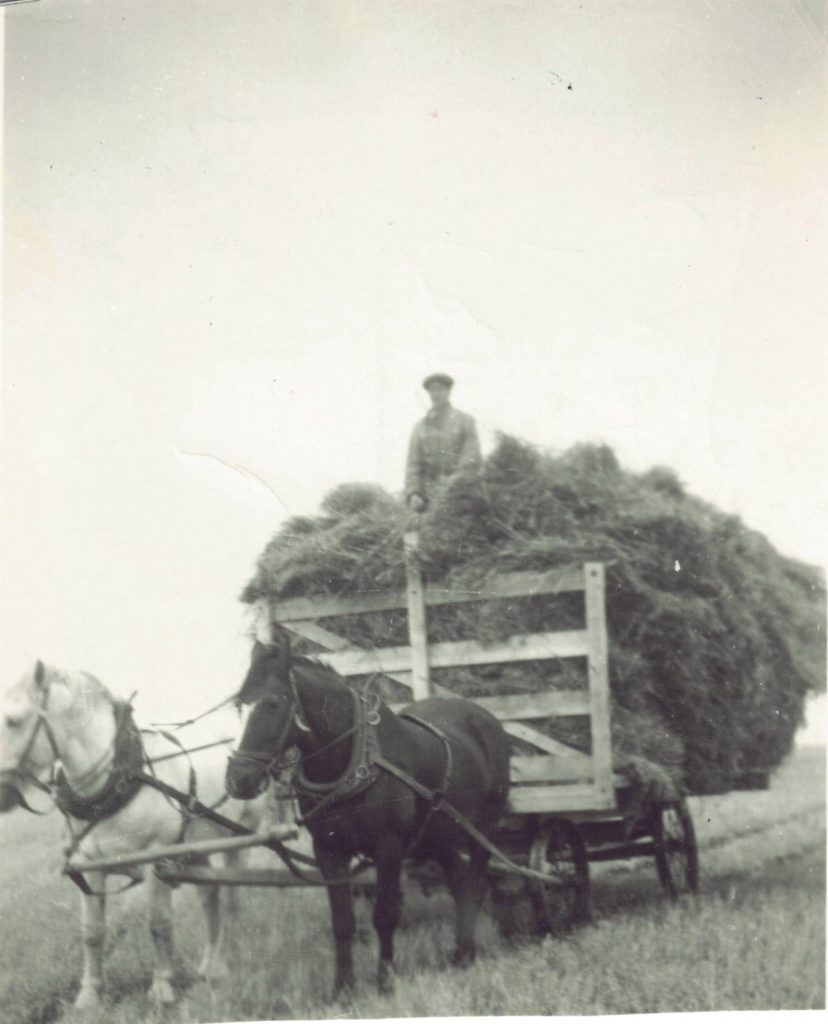
Grandpa (Vernon Delmar) Davies (Pictured):
“Thrashing in Lenore/Virden Manitoba 1947.
I loaded it all myself.”
My Grandma (Rosalie nee Malowny) Davies, would frequently say in passing through the decades, “it’s a good life if you don’t weaken”. It’s a variation on a quote particularly popular around 1908-1920s, and Grandma said it so often I honestly thought for many years she was the originator. It is apparently more often to hear “great” in place of good, but Grandma never dared to be that optimistic. Whenever Grandma would say it to our family, her jaw would tighten, and you could feel the, resolute, steel-tough, laser-focused steel toughness behind the words. She was laser focused on enduring and continuing onward.
My Grandma had a tough life.
I only realized, years later, how tough. She grew up poor, in a massive family, on a homestead in in Libau, Manitoba, where the girls and women worked to the bone, and often went hungry to feed the men. She didn’t speak much of that time. In fact, I only remember one story: during corn harvest, they were blessed to have food, and she had over 20 cobs in one sitting. Absolutely starving, and one moment in time they had an abundance of food for everyone.
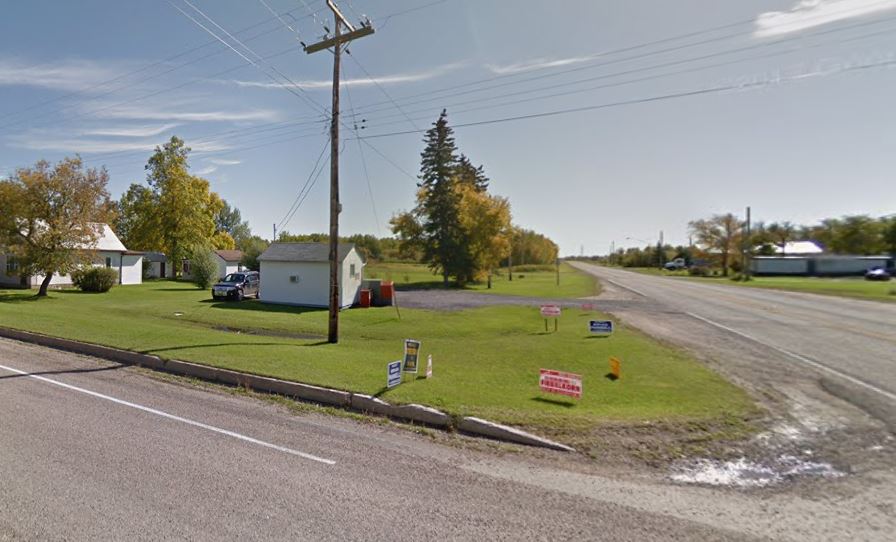
The booming town of Libau, Manitoba, seen today.
Post office is tiny white building centre-left.
My Grandpa Davies, similarly, grew up in Selkirk, Manitoba, on the homestead. His father taught him how to swim by throwing him off a bridge into the Red River. I am not kidding, this is literally what my Great Grandfather did to a young Literally not kidding, it was a story he told his entire life, with chills. If he hadn’t been able to stay afloat that day, well, I wouldn’t be writing this blog today. A whole family tree, gone.
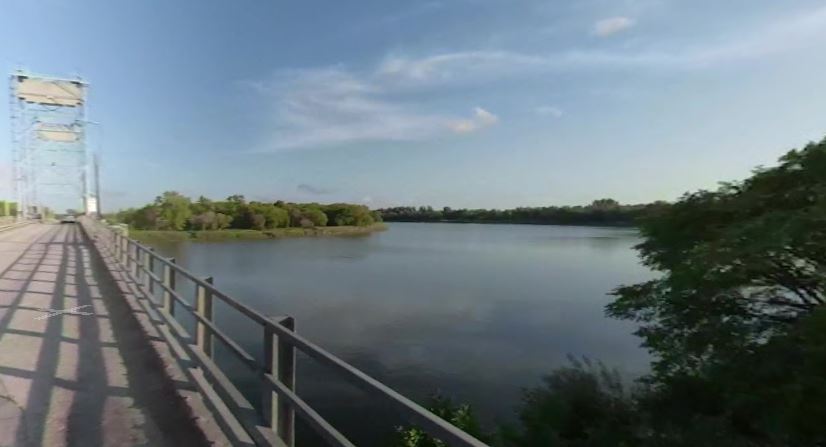
Selkirk Bridge today spanning the Red River
My Grandpa (Clifford William) Reade, similarly, had a tough upbringing in a huge family, emerging from his childhood with a toughness and a burning to make more of his life once out of the family home. His father was headmaster and teacher of the one room schoolhouse in Moose Jaw, Saskatchewan. As was the case with all my grandparents growing up (except for my Grandma Reade), I’m pretty certain corporal punishment was a regular occurrence.
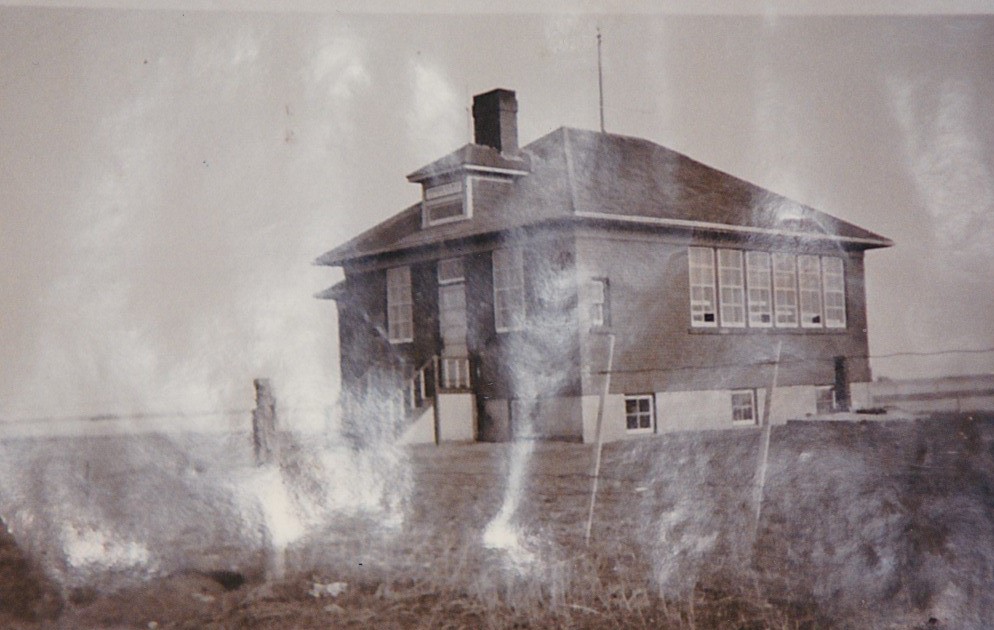
The school house my Grandpa attended under his father’s iron rule.
My Grandma (Vera) Reade grew up in a Duokhobor settlement, one of six children, in Blaine Lake, Saskatchewan. My Great Grandparents had left a much more climate-friendly watermelon-growing British Columbia Duokhobor settlement (due to circumstances I’ll share in a later post), to the harsh, unforgiving prairie with its bitterly cold winters. Grandma would recall feeding the men first, my Grandfather and his employees on the farm, and how the women would hungrily wait, eating afterwards if there was any food that remained.
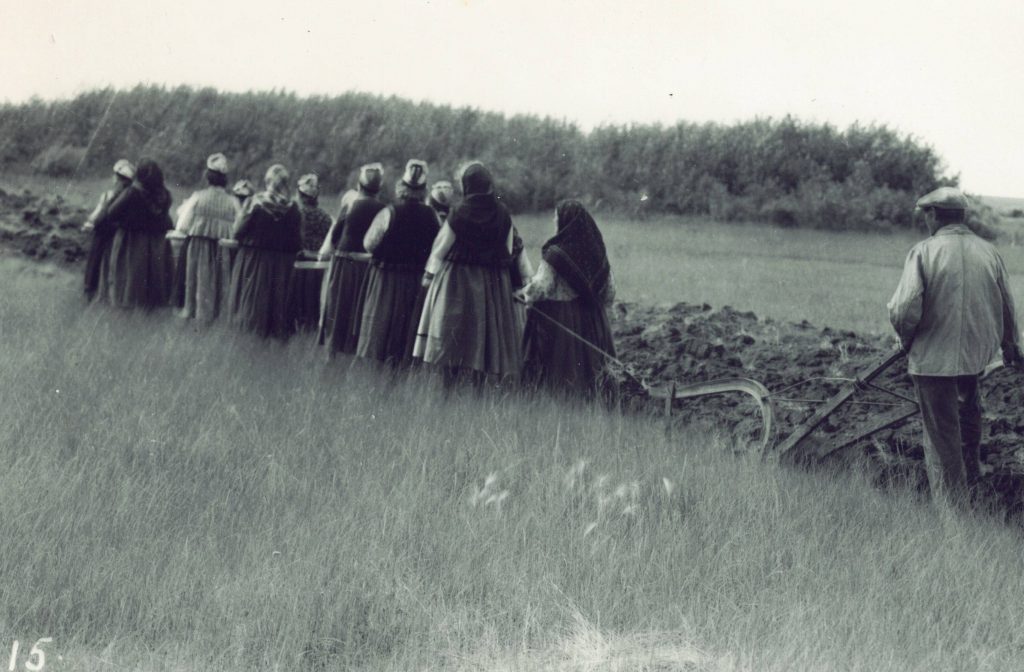
A team of women in traditional Duokhobor garb pull while the man steers the plow, breaking ground on the prairie for the first time, in the late 1800s, Blaine Lake.
“Duokhobor” is a Canadianized term for the Russian духоборы, духоборцы, or romanized, dukhobory or dukhoborsy. Duokhobors were traditionally known for their pacifism and Rejection of the Russian Orthodox Church, and the word duokhobor is translated to mean “spirit-wrestler”, or “spirit-warrior”.
I am always in awe that my four Grandparents, who all came from such harsh conditions in the early 1900s were able to triumph into self-actualized, successful, beautiful, thriving, loving human beings. I was blessed having them all for 2-4 decades in my life. I knew them well, loved them deeply, and had the agony of losing every one over a period of 20 years. Every day I honour them in special ways. I carry their love, their passions, their traditions, their artefacts, their pictures, their songs, their humour, and their cooking, as I continue onward in the world without them.
My Grandma’s saying would often speak lingered on in our family’s oral tradition. We would often use the phrase ironically, when facing challenging or unfortunate circumstances, usually with a cluck or chuckle.
The quote would also provoke deeper family discussions over the years. Is it a really good life when faced with brutal circumstances? What quality of life is it if you don’t enjoy the softer aspects of life? If you’re so hardened by life, so tough, is there any room for opening your heart to love, for enjoying the delights of the moment, for appreciating the subtle beauty of nature? It seems to suggest reinforcing the “stiff upper lip” and “real men don’t cry” concept.
For Grandma Davies, it was a reminder to stay strong and not letting the many hardships she faced break her. There was also a very physical, very mortal awareness to the quote, particularly with what she experienced in her childhood – the illness, the death, the starvation.
“Weaken” to me was never about a softening of the heart, or for that matter a tenderness or a heightened sensitivity. Sometimes the strongest thing you can do is surrender, bending like a reed instead of being brittle – that is the Tao, or natural way of the universe. Not weakening, at least in my personal experience, means knowing and drawing on the strength of my core spirit, and nurturing a healthy resilience so that, in Zen terms and my motto for life, when you fall down seven times you get up eight. It also means being strong enough and brave enough to open up your heart, knowing that the risk of your heart being shattered is worth it and having faith that somehow if/when it happens you will endure.
Dad would similarly often speak constantly over the years of the need to “drive forward”, “keep moving ahead”. It was of critical importance to him to constantly grow, change, transform. This was life. Submitting to stagnation and decay was not.
During this most devastating period of my life, with my heart shattered and my life shadowed in much darkness and pain, I falter. I can no longer feel the core I have relied on through the ups and downs of my life. I have zero resilience in reserve left- hardship, worry, stress, illness, and grief have depleted it to nonexistent levels, something I’ve never experienced before. My connection to the nurturing energies of the universe has been severed, and just as I can no longer taste after illness in July and August, I no longer feel joy watching a sunrise.
I’m not filling a hay cart, or pulling a plow, or fearing a beating, and I’m hardly starving. And yet I still find myself weakening. This Spirit Warrior is in a battle for her spirit and heart. She is struggling to find and revitalize her own essence, the spiritual core and burning deep within. I realize now that a large part of my own healing will rely on the the light, love, and wisdom my family blessed my life with. They are within me and a constant presence. Please, please, beloved Grandparents and Dad- please, help show me the way.
